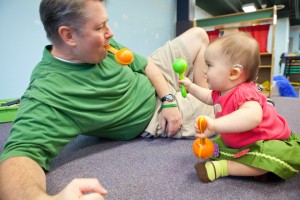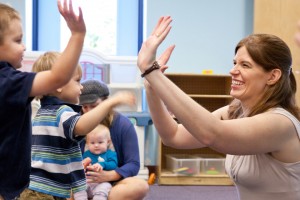I was leading a music group for little ones at a day care center the other day when a moment of tension arose with a staff member who was substituting for the regular teacher. The usual routine is for all the children and adults to gather together for music making. Everyone sings; everyone moves; everyone plays. This particular stand-in teacher herded the children into the room and then sat down outside the music, directly behind a little boy who might have been known for being ‘difficult’. I asked her directly to move her chair into the music circle, and she looked at me as if I had lost my mind. I could only imagine her thinking about the chaos that would ensue if she was not there to impose order and calm.
Then there is another group that I do at a local library. We sit on colorful mats on the floor. Off to the side are a set of benches that are usually filled with coats and shoes and bags and books that the children discard in order to be comfortable in the music circle. But on the first day of each new session, there is always a grownup or two who settle themselves firmly on the bench and shoo their kids off to the mats to play.
As a young mother I spent lots of time in music groups in my kid’s early years. I am also a music therapist who facilitates weekly early childhood music groups. What was my role in these groups as a mother? What is my role now as leader of these groups? What do I expect of the other grownups in the groups I lead? And what did I think I should be doing in my role as mother? What is your role in your child’s music group?
Some Roles That Don’t Work Well
‘The Enforcer’
The first story above is just one example of the kind of grownup that I call ‘The Enforcer’. The adult adopts the difficult job of making sure that the child adheres to some standard of behavior or performance. This could be making sure that the child is quiet and compliant. It could also be ‘helping’ the child accomplish some music task. That might be taking the child’s hands and pushing them together to clap; or grabbing a drum mallet with the child so she beats a steady beat. As care-givers, we need to model and shape behavior with respect for developmental level and individual personalities. ‘The Enforcer’, though, often sets expectations that are not in line with the child’s needs or the child’s style of learning. ‘The Enforcer’ sets up a situation where the child does not have the opportunity to learn and practice independence.
‘The Eavesdropper’
This role removes the grownup from the music action and puts them in the place of on-looker and observer. The child, as well as the rest of the group, is open to scrutiny without any real sense of the excitement and energy that comes from participation. Sitting on the sidelines ‘The Eavesdropper’ is limited in understanding both their child’s responses as well as the subtle moments of engagement between the child and the music. Since they are not fully involved in the activity, ‘The Eavesdropper’ generally does not learn or integrate the music and so there is not chance to carry over songs or actions into the rest of the child’s life.
‘The Eloper’
Any parent, caregiver, or early educator knows that raising children can be demanding and exhausting. When a parent sits down in music group and slumps down with a blank-looking face it might be that she was awake at work all night, or that he had to jump start the car just to get here in time. We can all empathize with those moments. ‘The Eloper’, though, makes a deliberate choice to ‘check out’ of the situation. They sit with their child and they might go through the motions of a song or limply shake a maraca. But their attention will drift off to check their smart phone, or they will look at their watch every few minutes. ‘The Eloper’ might find a partner and will begin to discuss last night’s dinner or how expensive it was to fill up her car. The message to their child is very clear. “There is something more important than you right now”. It also conveys to the child and the rest of the group that the music experience is not worthy of attention.
Roles that Work Well for You and Your Child
‘The Enthusiast’
The motto of ‘The Enthusiast’ might be “This is awesome!” Words, actions and affect all combine to give the clear sign that there is value in the music group. ‘The Enthusiast’ supports the child, the group and the music leader through joining in with delight. This might be singing along, dancing, playing or just smiling broadly. The gusto of ‘The Enthusiast’ positively influences the group and makes the music experience more fun for everyone including themselves and their child.
‘The Engager’
This role really takes advantage of perhaps the most important underlying purpose of joining an early childhood music group – being together with your child in an experience that has meaning. ‘The Engager’ participates fully in all the music experiences in a way that is responsive and reflective of their own child’s engagement. ‘The Engager’ and the child move and sing and play in synchrony and show joy in matching their music. If the child is quiet and reserved, ‘The Engager’ might soften their own singing and playing. If their child goes after things with gusto, the music response is just as active. ‘The Engager’ is alert to all the musical moments – big and small- and celebrates each one through imitation, encouragement, and focus.
‘The Equal Partner’
It might seem to some parents and caregivers, that society feels that their child’s development is best left to ‘experts’. Programs and schools sometimes give the impression that they alone know what is best for the child. ‘The Equal Partner’ knows that it takes everyone and every role to create the best growth opportunity for children. This role combines ‘The Enthusiast’ and ‘The Engager’ as well as ‘The Educator’ and ‘The Experiencer’. ‘The Equal Partner’ takes responsibility for making the music group work best for their child, the group and the music leader. They sing and play within the group. They also share the music at home or in the classroom while also letting the child lead the music.
What is your role in your child’s music group?
Here are some suggestions for creating the best possible role for you and your child:
• Have clear expectations of what you want from the music group for both you and your child
• Ask the music leader what is expected of you and of your child during the group
• Talk with the leader if you find yourself falling into one of the less productive roles. Tell them if you think you have to be ‘The Enforcer’ because of management style or lack of consistency in expectations. If you feel like ‘The Eavesdropper’ or ‘The Eloper’ because you don’t feel included in the experiences, make sure to discuss this with the leader
• Be open to constructive suggestions from the leader. Go in with the attitude that they also want what is best for you and your child
• Give it some time. All groups need to be together and get to know each other before they can work smoothly
• Keep everything in perspective. Growing up and helping children grow up is a process and happens through all life’s experiences




Excellent article and suggestions for parents! Another site that recommends parent participation in music is found in Theraplay. Most parents who do not participate as desired are doing so out of lack of knowledge. Your article gives lots of great ideas for parents who are reticent or have not had the role model in their life to know what is required. Hopefully the music instructors provide for this education.
I’ve been thinking about this topic lately because I’m a music therapist who attends a lot of story time classes with my 13 month son. (The story time classes that we attend are hosted by my local library and include a lot of music & movement.) I have played every type of role that you’ve listed above during these groups. Usually I start out as THE ELOPER and end up as THE ENGAGER. I find that I need to go through those roles that don’t work so well in order to get to a role that will work better for my child. This process takes place during the course of the session because when I am attending these groups, I’m a participant/client along with my child. I need the community within the group to help me when I’m not at my best… so that I can get to my best, even if it is within the xx minutes of a children’s group class. That turn-around that I experience is what will carry over to the rest of the day so that I can be at my best for my child.
Thanks for taking the time to read and respond to this blog, Michelle. I always think that my job as facilitator of groups is to create a community through the music making. Kids and grownups become vested in the group and in each other. So I love your comment “I need the community within the group to help me….so I can get to my best…” Beth
This is fantastic! Thanks to Michelle for linking it up. This is good information for myself as a parent, and to teach my older children as well. I can think of several places where being an “Equal Partner” will be beneficial.
Well written, Elizabeth! So many fantastic things to think about and share with my families! Thank you!
Great article.
It’s something that I have had experience of recently. I run my own baby and toddler music sessions and have been doing taster sessions at established toddler groups. I have found that at a lot (though not all) of these groups, parents just don’t interact with their children and expect others to entertain them while they drink tea.
Even after I explained to them what my session was about and encouraged them to join in they pretty much sat on the side lines.
I dont know whether they are embarrassed or whether they would just rather chat with friends.
It’s a real shame as the Children were having great fun and I had to cut the session short.
I now no longer go to established groups and concentrate on my own, where the parents understand the importance of singing with their kids.